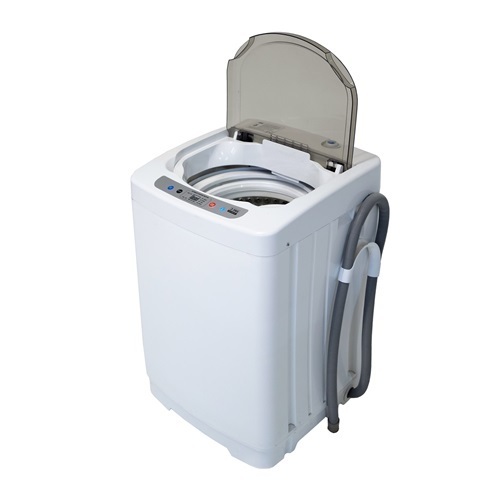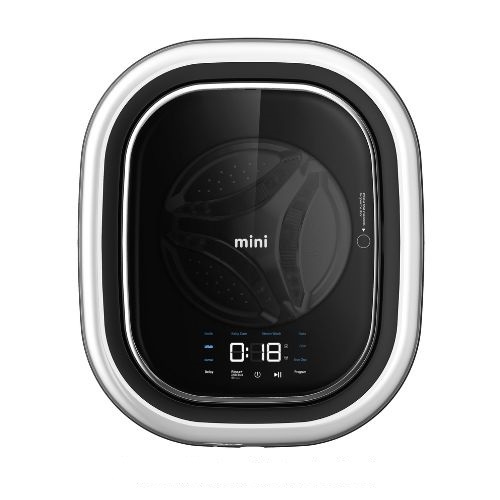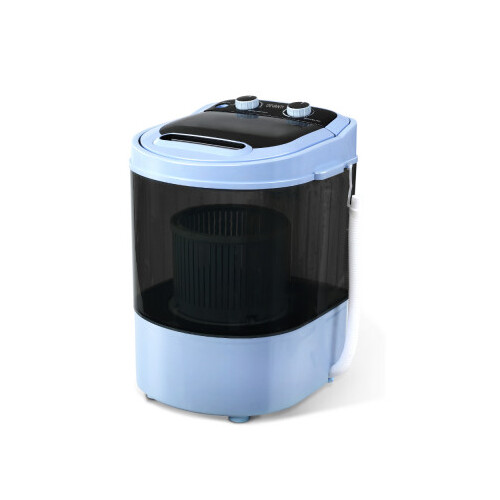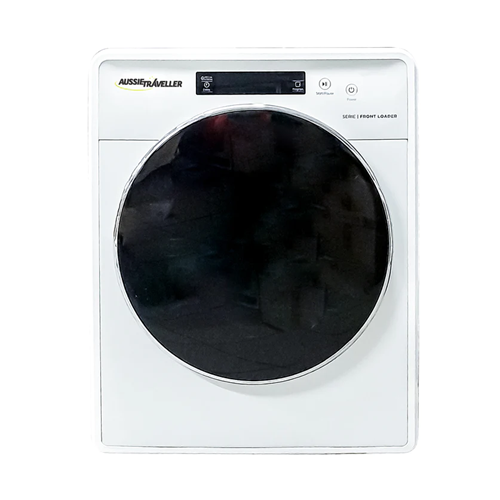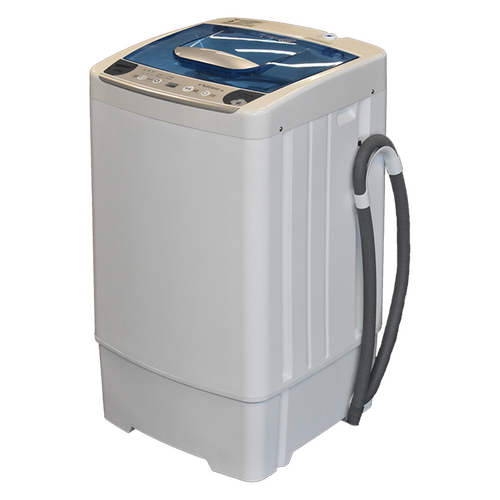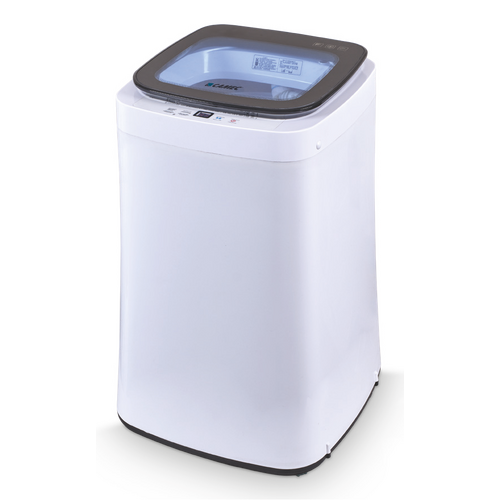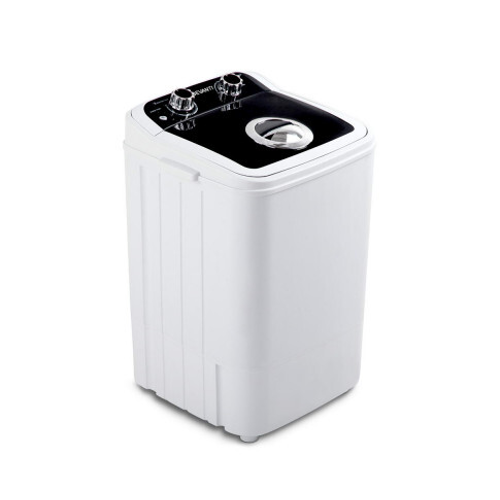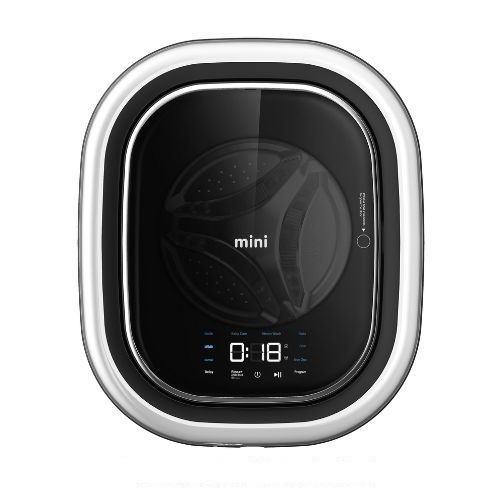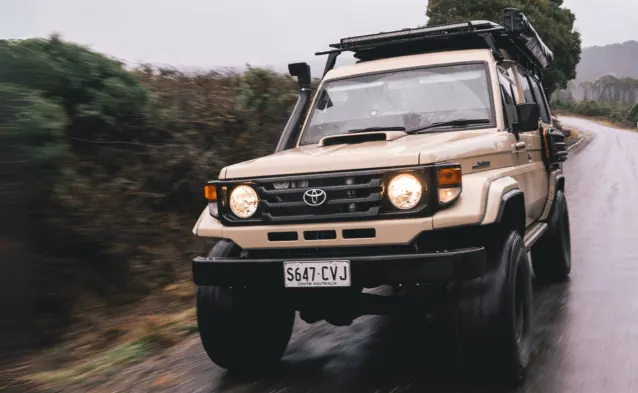Let's be honest, tackling laundry on the road can feel like a chore that eats into your precious holiday time. Between hunting down laundromats, lugging heavy bags, and watching those coins disappear, it's enough to make you wish for a magic laundry fairy! But what if we told you there's a way to reclaim those hours and keep your clothes fresh without the hassle? Enter the caravan washing machine. These nifty appliances are a game-changer for Aussie caravanners, offering a convenient and cost-effective solution to on-the-go laundry. Think about it: instead of spending a good chunk of your afternoon at a laundromat, you could be relaxing by the beach or exploring a new town.
This guide is here to walk you through everything you need to know to choose the best caravan washing machine for your needs. We'll explore the different types available, from the popular front load caravan washing machine and the space-saving wall mounted washing machine caravan, to the convenient top load caravan washing machine and even compact options like a portable washing machine for camping. By the end of this, you'll be well-equipped to make the right decision and say goodbye to laundry day blues on your next adventure!
Types of Caravan Washing Machines
Choosing the right caravan washing machine can make a world of difference to your travel experience. Luckily, there are a few different types out there, each with its own set of advantages and disadvantages. Let's take a closer look:
Front Load Washing Machines
You've probably seen these in most homes, and they're becoming increasingly popular in caravans too.
Advantages:
-
Space Savers: One of the biggest pluses is their ability to slide neatly under benches. This is a real win when caravan space is at a premium.
-
Water Wise: Front loaders are generally more water-efficient, using around 30-40% less water compared to their top-loading counterparts. That's good news for your water tanks!
Disadvantages:
-
Level Playing Field: They need to be on a pretty level surface to operate properly, which might require a bit of adjustment depending on where you park up.
-
A Bit More of an Investment: Generally, front load machines tend to be a bit pricier upfront.
Ideal Users: If you've got under-bench space and are keen on conserving water, a front load caravan washing machine could be a fantastic option.
Top Load Washing Machines
These are your classic washing machines, just scaled down for caravan use.
Advantages:
-
Easy Access: No bending down required! Loading and unloading is a breeze, which can be a real plus for some.
-
Simpler to Load: You can often chuck in that stray sock even after the cycle has started.
-
Speedy Gonzales: Top loaders typically have faster wash cycles.
Disadvantages:
-
Vertical Challenge: They need vertical space, which might not be available in all caravan layouts.
-
Thirsty Machines: Generally, they use more water than front loaders.
Ideal Users: If accessibility and a quick wash cycle are high on your list, a top load caravan washing machine might be the way to go.
Wall-Mounted Washing Machines
These are a more specialised option designed to save maximum floor space.
Advantages:
-
Floor Space Hero: Mounted on the wall, they free up valuable floor area, which is gold in a caravan.
-
Modern Flair: They often come with some pretty sleek and modern features.
Disadvantages:
-
Installation Hurdles: Installation can be a bit more complex, as you'll need to ensure the wall is strong enough to support the machine.
-
Wall Power Required: You'll need a suitable wall area that can handle the weight and vibrations.
Ideal Users: If floor space is super tight but you have a suitable wall area, a wall mounted washing machine caravan could be a clever solution.
Portable Washing Machines
These are the ultimate in flexibility and are great for those who don't need to do large loads regularly.
Advantages:
-
Super Flexible: They can be moved around and stored away when not in use, making them ideal for saving space when you're not washing.
-
Budget-Friendly: Often, these are the most affordable option.
Disadvantages:
-
Small but Mighty (Small): They have a smaller capacity, so you'll be doing smaller loads more often.
-
More Hands-On: Some models might require a bit more manual intervention, like filling and draining the water.
Ideal Users: If you're a weekend traveller or have limited storage space and only need to wash small loads occasionally, a mini washing machine for camping could be a good choice.
Key Specifications to Consider
Choosing the right automatic caravan washing machine isn't just about picking one that looks good. You need to consider how it will fit into your caravan life and meet your laundry needs. Here are the crucial specs to wrap your head around:
Capacity: How Much Can You Wash at Once?
The capacity of a caravan washing machine refers to how much laundry it can handle in a single load. It's usually measured in kilograms (kg) of dry clothes. You'll typically find caravan washing machines ranging from 2.5kg to 5kg.
Suitability for Different Household Sizes:
-
2.5kg: Ideal for solo travellers or couples on shorter trips. Think a few t-shirts, a couple of towels, and some undies.
-
3-3.5kg: A good middle ground for couples or small families on longer trips. You could fit in a small sheet set, a few more clothes, and maybe a pair of jeans.
-
4-5kg: Better suited for families or those who prefer to do larger loads less frequently. This could handle a double sheet set and a decent amount of clothing.
Dimensions and Installation Requirements: Will It Fit?
Before you fall in love with a particular model, you need to make sure it will actually fit in your caravan!
Standard Dimensions for Each Type:
-
Front Load: Generally designed to fit under standard bench heights, with widths around 60cm and depths around 50-60cm. Height can vary.
-
Top Load: Tend to be narrower but taller, requiring vertical space. Widths might be around 40-50cm, depths around 50-60cm, and heights around 70-90cm.
-
Wall-Mounted: Compact and designed to sit flush against a wall. Dimensions vary but are generally smaller than other types.
-
Portable/Mini: Dimensions vary greatly, but they are designed to be compact and easily stored.
-
Clearance Requirements: Don't forget to factor in space for hoses, power cords, and opening the door (especially for front loaders). Check the manufacturer's specifications for minimum clearance requirements.
-
Weight Considerations: Caravan weight is crucial. Check the weight of the washing machine, especially if you're considering a wall-mounted unit, as the wall will need to support it.
Measure your available space carefully and compare it to the machine's dimensions before making a purchase.
Power Requirements: Keeping the Washing Machine Running
Most caravan appliances run on 12V, but washing machines typically need more power.
-
Standard Power Needs: Most caravan washing machines are designed to run on 220-240V AC power, the same as your household appliances.
-
Energy Efficiency Ratings: Just like water, washing machines have energy efficiency star ratings. A higher rating means it uses less electricity per cycle.
-
Compatibility with Solar/Inverter Setups: If you rely on solar power, you'll likely need a good-sized inverter to run a 240V washing machine. Consider the power draw of the machine (usually listed in watts) and the capacity of your solar/inverter system. You might need to run the generator while washing if your solar setup isn't sufficient.
Top Brands in the Australian Market: Who's Who in Caravan Laundry?
When it comes to choosing a caravan washing machine in Australia, several brands have carved out a reputation for quality and reliability. Here's a closer look at some of the key players:
Aussie Traveller is often praised for its durable machines specifically designed with RV use in mind, striking a good balance between features and price. They typically offer both front and top load models, with capacities ranging from 2.5kg to 4kg and generally good water efficiency, often around 4 to 4.5 stars on some models.
Sphere is another popular choice, particularly among experienced caravanners, known for the reliability and water efficiency of their front and top load machines. Their capacity range is similar to Aussie Traveller, and they often boast good to very good water ratings, frequently achieving 4 to 4.5 stars. While they can be on the higher end of the price spectrum, their reputation for longevity makes them a worthwhile consideration for many.
Camec is a well-established brand within the caravan industry, offering both front and top load washing machines. They are generally considered a good value option, with capacities typically around 2.5kg to 3.5kg and a water efficiency rating that often sits at 4 stars. While they might not always have the most cutting-edge features, their reliability and brand recognition make them a solid choice.
For those on a tighter budget or needing more flexible options, Devanti offers a wider range, including top load and portable/mini washing machines. Their capacity can range from 2kg to 4.5kg, and while some models are very affordable, it's worth noting that their water efficiency can vary, and some users might have concerns about long-term durability. However, their portable models are a great solution for those with limited space or occasional laundry needs.
Winia (Daewoo) focuses on compact and efficient front load designs, often incorporating user-friendly controls. Their machines typically have a capacity around 3kg and a good water efficiency rating, usually around 4 stars. They are a good option for those prioritizing a space-saving wall mounted front loader with quiet operation. However, their model range might be more limited compared to some other brands.
Ultimately, the best brand for your needs will depend on your specific priorities, whether that's budget, space, water efficiency, brand reputation, or specific features. It's recommended to research specific models within these brands, read user reviews, and compare features and prices to find the perfect fit for your caravan.
Our latest Caravan Washing Machines come from NCE which have eight models including top load and wall mounted options
Installation Guide
So, you've chosen your perfect caravan washing machine – fantastic! Now comes the slightly less glamorous but equally important part: installation. Getting it right from the start will save you headaches down the track.
Planning Your Installation: Measure Twice, Wash Once
Careful planning is key to a smooth installation. We can't stress this enough! Double-check the dimensions of your chosen washing machine and compare them against the space you have available. Remember to account for:
-
Width, Depth, and Height: Ensure the machine fits snugly without being too tight.
-
Door Clearance: For front loaders, make sure you have enough space to fully open the door. For top loaders, check for clearance above the machine.
-
Hose Connections: Allow extra space at the back for water inlet and drain hoses.
-
Power Cord: Consider the location of your power outlet.
Water Supply Considerations: Your washing machine will need a reliable water source.
-
Direct Connection: Some caravans have dedicated washing machine water inlets. If yours does, check the thread size and ensure compatibility with the machine's inlet hose.
-
Tap Connection: You might need to connect the inlet hose to an existing tap, perhaps in the kitchen or bathroom. You might need a suitable adapter for this.
-
Portable Tank (for some mini machines): Some smaller, more portable machines can be filled manually from a water container.
-
Water Pressure: Most washing machines require a minimum water pressure to operate effectively. Check the manufacturer's specifications. Low pressure might mean longer fill times or the machine not working correctly.
Drainage Options: You'll need a way to get the dirty water out.
-
Dedicated Drain Outlet: Some caravans have a specific drain outlet for washing machines.
-
Sink or Shower Drain: You might need to position the machine so the drain hose can empty into a sink or shower drain. Ensure the hose is secured to prevent it from slipping out during a cycle.
-
External Drainage: For some portable setups, you might be able to drain the water directly outside (check local regulations and be mindful of the environment).
Take your time with the planning stage. It’s much easier to address potential issues before you start wrestling the washing machine into place.
Troubleshooting Common Installation Issues
Even with careful planning, you might encounter a few hiccups. Here are some common issues and how to tackle them:
Uneven Surfaces Solutions: Caravan floors aren't always perfectly level.
-
Adjustable Feet: Most washing machines have adjustable feet. Use a level to ensure the machine is sitting level and adjust the feet as needed. This is crucial, especially for front loaders, to prevent vibrations and potential damage.
-
Shims: For minor unevenness, you can use thin pieces of wood or rubber (shims) under the feet to level the machine.
Dealing with Limited Water Pressure: If your caravan's water pressure is on the low side:
-
Check Your Pump: Ensure your caravan's water pump is working correctly and is set to an appropriate pressure.
-
Elevate the Water Source: If you're using a portable water tank, raising it slightly might increase the water pressure.
-
Consider a Pressure Booster: For consistently low pressure, you might consider installing a small inline water pressure booster. However, this is a more involved solution.
-
Choose a Low-Pressure Machine: Some washing machine models are designed to operate with lower water pressure. If you know you'll frequently encounter low pressure, this is worth considering during the selection process.
Water and Power: How Much Will You Really Need?
Understanding the water and power consumption of your caravan washing machine is crucial for planning your trips and managing your resources effectively. While the exact figures will vary depending on the machine model and wash cycle, here's a rough idea to help you estimate your needs.
Water Consumption
To estimate your water usage, you'll need to know the water consumption per cycle for the washing machine you're considering. This information is usually available in the product specifications.
Average Water Usage: Front load machines typically use between 40-60 litres per cycle, while top load machines can use 70-120 litres per cycle. Mini/portable machines might use less, around 15-30 litres per wash.
Factors Affecting Water Usage:
-
Wash Cycle: Shorter cycles generally use less water. Eco modes are designed to minimise water consumption.
-
Load Size: While the machine will adjust to some extent, larger loads might trigger higher water usage.
-
Rinse Cycles: Some machines allow you to add extra rinse cycles, which will increase water consumption.
Estimating Your Weekly Usage:
-
Estimate your average number of wash cycles per week: For example, 3 cycles.
-
Find the water consumption per cycle for your chosen machine: Let's say it's a front loader using 50 litres per cycle.
-
Multiply the number of cycles by the water consumption per cycle: 3 cycles * 50 litres/cycle = 150 litres per week.
.png)
Power Consumption
Power consumption is measured in kilowatt-hours (kWh). Washing machines use power primarily for the motor and, if applicable, heating the water.
Average Power Consumption: Front load machines typically use between 0.5 - 1.5 kWh per cycle, with the higher end being for cycles with hot water. Top load machines might use slightly less for the wash cycle itself but can use more overall if they have a less efficient motor. Mini/portable machines generally have lower power consumption, perhaps 0.2 - 0.5 kWh per wash.
Factors Affecting Power Usage:
-
Heating Water: Cycles that heat the water will consume significantly more power than cold water washes.
-
Spin Cycle: Higher spin speeds require more power.
-
Wash Cycle Duration: Longer cycles will generally use more power.
-
Energy Efficiency Rating: Machines with higher energy star ratings will use less power.
Estimating Your Weekly Usage (using a generator):
-
Find the power consumption per cycle for your chosen machine: Let's say it's a front loader using 1 kWh per cycle (including some hot water).
-
Estimate your average number of wash cycles per week: Again, let's say 3 cycles.
-
Multiply the number of cycles by the power consumption per cycle: 3 cycles * 1 kWh/cycle = 3 kWh per week.
-
Consider generator run time: If your generator produces, for example, 2 kWh per litre of fuel, then you would need approximately 1.5 litres of fuel per week for washing.
Estimating Your Weekly Usage (using solar):
Estimating solar needs is more complex as it depends on your solar panel output, battery capacity, inverter efficiency, and weather conditions. However, you can get a rough idea:
-
Find the power consumption per cycle (in Amp-hours): You'll need to convert the kWh to Amp-hours based on your battery voltage (usually 12V). A rough conversion is 1 kWh ≈ 83.3 Ah at 12V. So, 1 kWh per cycle is roughly 83.3 Ah.
-
Multiply by the number of cycles: 3 cycles * 83.3 Ah/cycle = 249.9 Ah per week.
-
Assess your battery capacity and solar generation: This tells you how much capacity you'll be drawing from your batteries and how much your solar needs to replenish. Remember that you shouldn't discharge your batteries too deeply (ideally no more than 50% for lead-acid, though lithium can handle deeper discharges).
Wrapping Up: Choosing a Caravan Washing Machine
Getting a caravan washing machine can make your travels way easier, saving you time and money on laundry. Here's a quick rundown of what to think about and some simple suggestions.
Quick Checklist for Picking Your Machine:
-
Size: Does it fit your caravan?
-
How Much You Wash: Choose the right size machine for your needs.
-
Water Use: If you're off-grid a lot, pick a water-saving model.
-
Power Needs: Make sure it works with your caravan's power setup.
-
Must-Have Features: What wash cycles do you really need?
-
Good Brands: Stick with well-known brands for reliability.
-
Your Budget: How much are you willing to spend?
Simple Recommendations: Top Picks
-
Best All-Rounder (Front Loader): Think Aussie Traveller. They're usually reliable and good with water and power.
-
Good Value (Top Loader): Camec is a trusted brand that won't break the bank.
-
Saving Space: A small Wall-Mounted front loader from Winia is your best bet.
-
Small Loads/Easy to Move: Devanti has some good, affordable mini options.
-
Saving Water & Power: Look for front loaders from Sphere or Aussie Traveller with high star ratings.
-
Top Quality: If you want the best and don't mind spending a bit more, check out Dometic.
Final Tips Before You Buy:
-
Measure your space carefully!
-
Think about how you usually do laundry.
-
Read what other Aussie caravanners say about different machines.
-
Shop around for the best price.
-
Figure out if you can install it yourself or need help.
Getting a caravan washing machine is a great way to make life on the road more comfortable. Just keep these simple things in mind, and you'll find the perfect machine for your adventures! Explore our full range of Caravan Washing Machines here.
Caravan Washing Machine FAQs
-
1. Do caravan washing machines require special plumbing?
Most caravan washing machines will need connections to a water supply and a drainage outlet. Some caravans have dedicated plumbing for washing machines. If not, you might need to connect to existing taps and drain into a sink or shower. Portable models might have simpler filling and draining requirements. Always check the manufacturer's installation instructions.
-
2. Are caravan washing machines noisy?
Noise levels vary between models. Front loaders are often quieter than top loaders, especially during the spin cycle. Look for models with lower decibel ratings if noise is a concern.
-
3. What is the average lifespan of a caravan washing machine?
The lifespan can vary depending on the brand, model, and how frequently it's used. Generally, a well-maintained caravan washing machine from a reputable brand should last for several years.
-
4. Are there any special considerations for using a washing machine in a caravan?
Yes, it's important to ensure the machine is level during operation, especially for front loaders. Also, be mindful of your water and power consumption, and secure the machine properly to prevent movement while travelling.
-
DISCLAIMER* Please note, this advice is general in nature and we strongly recommend consulting the product manual and where relevant, a professional installer.
